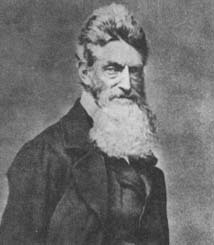John Brown Trial: 1859
Brown's Lawyers Search For A Defense
Brown's attorneys had to put together a defense in the face of opposition not only from Judge Parker and prosecutor Hunter, but from Brown himself. When the trial began, Botts made a critical motion to Judge Parker. Botts asked him to declare Brown insane, using a telegram from a certain A.H. Lewis of Akron, Ohio, to support this plea. Lewis, who apparently had known Brown from when the family lived in Akron, wrote, "Insanity is hereditary in that family.… These facts can be conclusively proven by witnesses residing here, who will doubtless attend the trial if desired."
A successful insanity defense could have saved Brown from the gallows, leaving him to live out his life in an asylum. Brown himself, however, closed the door on the issue. Protesting from his cot, he said angrily: "I look upon this as a miserable pretext of those who ought to take a different course in regard to me, if they took any at all.… I am perfectly unconscious of insanity, and I reject, so far as I am capable, any attempt to interfere on my behalf on that score." This outburst effectively destroyed the chances for any insanity defense, despite some later attempts to revive the issue.
Despite their Virginia roots and the weight of Southern opinion, Botts and Green had gone out on a limb for Brown by asserting "hereditary insanity" and were soon out of the case. They were replaced by Hiram Griswold, a lawyer from Cleveland, Ohio, and Samuel Chilton, a lawyer from Washington, D.C. Judge Parker would not permit the momentum of Hunter's prosecution to slacken for one instant, however, and refused to give Griswold and Chilton any extra time to organize their defense. Hunter had more than enough witnesses ready to testify.To support the charge of murder, witnesses described the killings by Brown and his men during the Harpers Ferry raid. The charge of insurrection was supported by the testimony of witnesses who had overheard Brown talk of arming runaway slaves to fight their masters.
 John Brown's photograph was taken shortly before his death.
John Brown's photograph was taken shortly before his death.
Despite the disadvantages he labored under, Griswold put together an aggressive closing statement. He attacked the charge of insurrection, claiming that as a non-Virginian Brown didn't owe the commonwealth any duty of loyalty. This last line of defense fared no better than the insanity argument. After less than an hour of deliberation, the jury returned a guilty verdict. Judge Parker then held the trial in recess for a few days while one of Brown's fellow raiders was tried in the same courtroom. On November 2, the trial was reconvened and Judge Parker sentenced Brown to hang on December 2, 1859.
Additional topics
- John Brown Trial: 1859 - Brown's Martyrdom Secures Victory In Death
- John Brown Trial: 1859 - Virginia Tries Brown For Treason
- Other Free Encyclopedias
Law Library - American Law and Legal InformationNotable Trials and Court Cases - 1833 to 1882John Brown Trial: 1859 - Brown Raises Sword Of Abolition, Virginia Tries Brown For Treason, Brown's Lawyers Search For A Defense